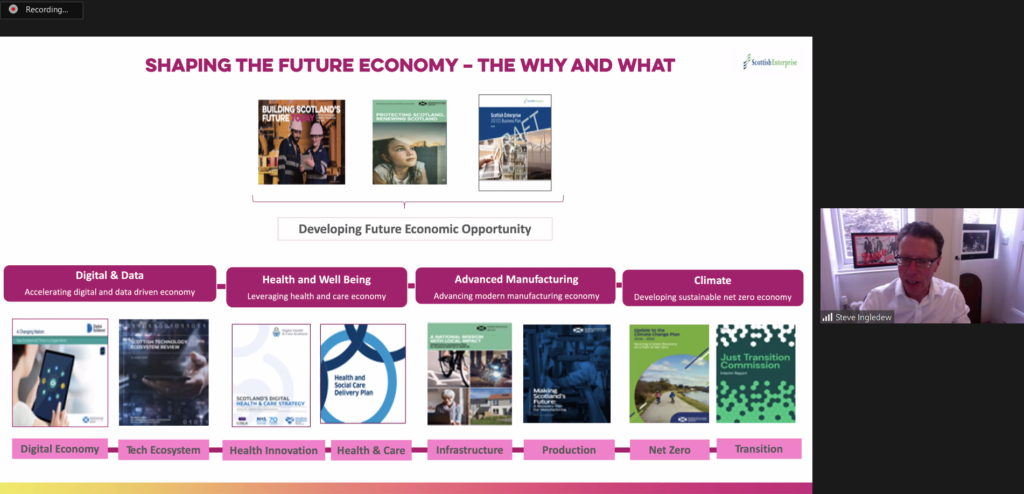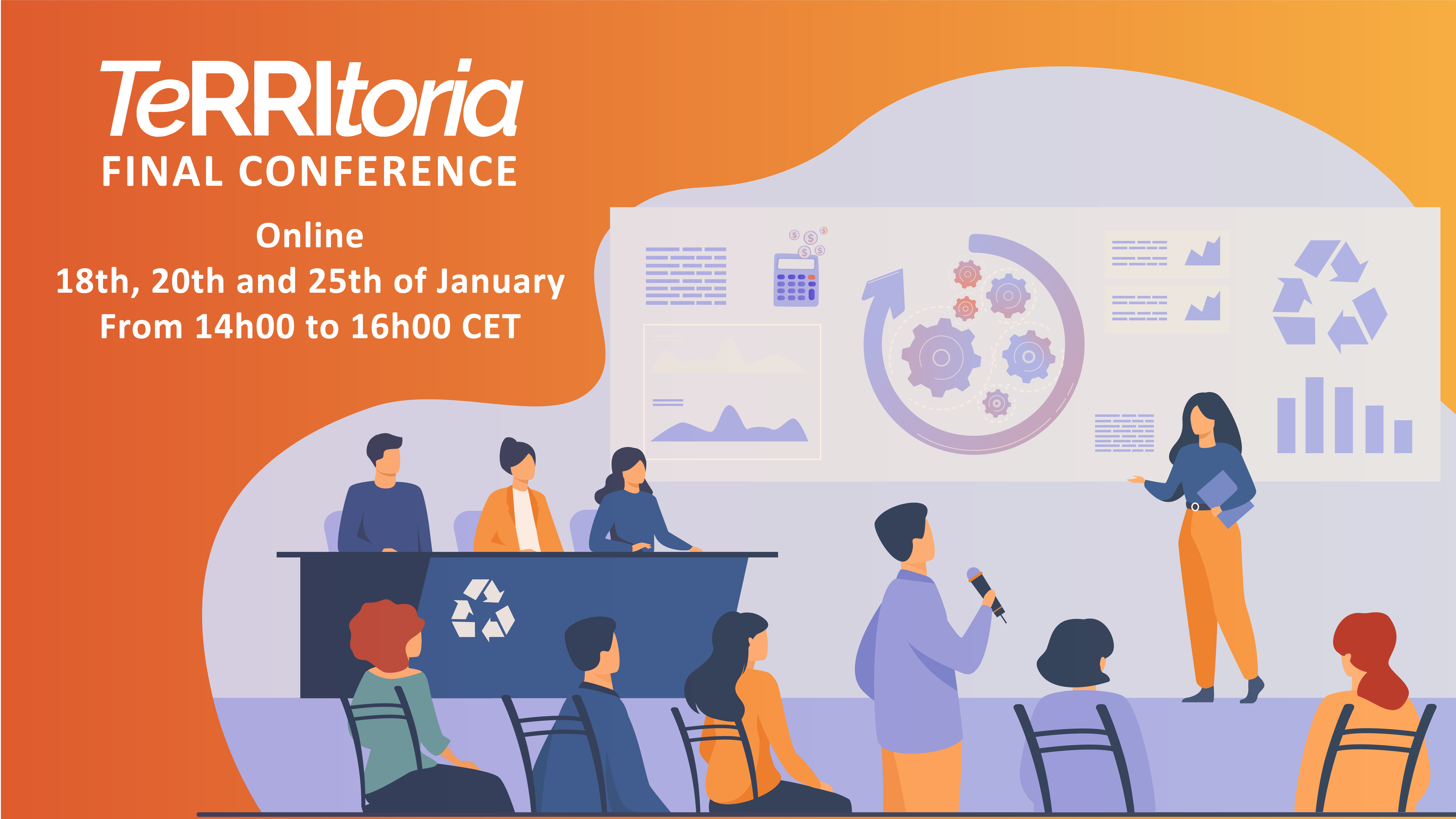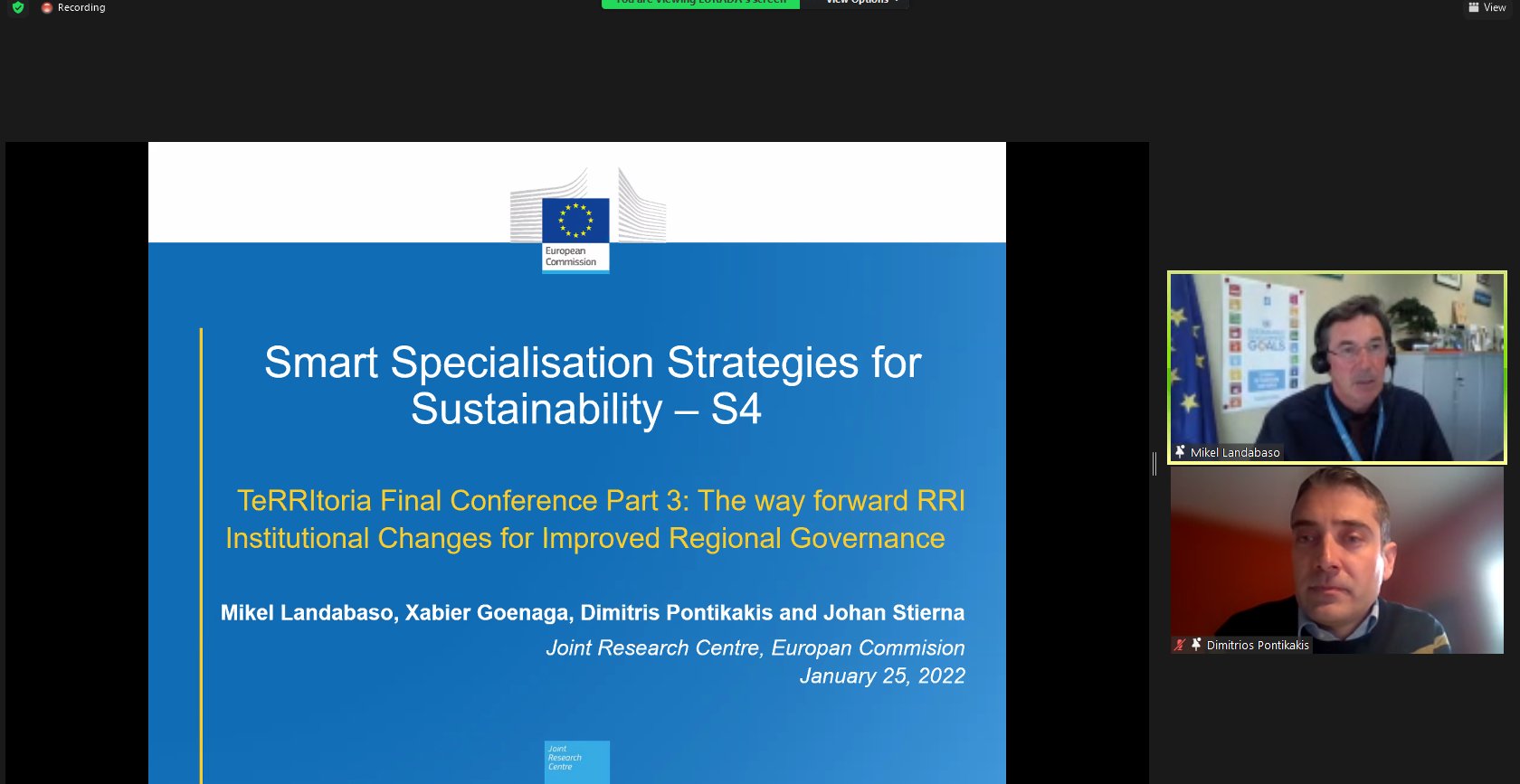ResponsibleRegions dialogue – Shaping the future economy: innovation and collaboration driving Scotland’s net zero & inclusive economy
TeRRItoria’s seventh #ResponsibleRegions dialogue was held on the 20th of May 2021. The topic for this instalment was the drive for Scotland’s net zero & inclusive economy through innovation and collaboration to shape the future economy. Academics and experts on economic development discussed the implementation of responsible research and innovation in practice with Mr Stephen Ingledew, Director of FinTech Scotland & Scottish Enterprise, the largest development agency in Europe.
Mr Ingledew presented insights from his experiences on how to rethink and redesign the economy, as a manner to look ahead rather than behind back in times that are an opportunity to the structure of our economy. He organised his presentation in 5 main points that he finds important to collectively develop the future economy and leverage economic opportunities through aligned purpose and collaborative engagement. These main points answered question such as “Why”, “What”, “How”, “Who” and “What outcomes to expect”.
The first point was answering the “Why” question, as in why develop Scotland’s future economic opportunities to grow jobs and green recovery. The answer to this was pretty straightforward: to create new jobs which are good and green and which pay well whilst addressing the ecological and social challenges that we face.
Concerning the “What”, our main speaker identified 4 main areas that will be interesting to develop in future:
- Digital & data: there is a need to accelerate adoption to improve economic performance.
- Health & Well Being: this one is now more important and obvious because of the Covid-19 pandemic and its outcomes. It is linked to creating opportunities in social and economic aspects in these subjects. It is also heavily related to technology and the “Digital & data” area.
- Advanced Manufacturing: there is a need to develop new ways to produce old things (construction…), or new things altogether (space…)
- Climate: fighting and adapting to climate change with the development of the sustainable net zero economy is a major aspect of Scotland’s future economy.
Regarding “How” he plans to address these issues and develop Scotland’s net zero economy, Mr Ingledew presented six potential ways to act through:
- Strategic Programmes: Here Mr Ingledew recommended identifying one or multiple areas and create a programme that will act on them, such as those he showcased during his presentation.
- Ecosystem Intervention: Identifying where to intervene to help companies grow was also raised as important. For example, in order to support start-ups, Scottish Enterprise conducts a “Scottish Technology Ecosystem Review” that gives a clear view on the people, infrastructure, and funding available to help them expand their operations.
- Innovation Clusters & Districts: The aim of this, he emphasises, is to create collaboration between actors on difficult subjects. There are major benefits to be gained from co-learning and open and inclusive innovation laboratories. These help big enterprises create value and allow for the creation of new smaller ones to work with them on those new subjects.
- Industry Transition: On this point Stephen presented the example of a Michelin factory that was shutting down but was then reinvented by government & local universities to make use of new supply chains and pursue new activities, as it is now an innovation park shaped for the future. He also gave the example of Construction Scotland that created their own innovation centre, dedicated to their “Building for Zero” initiative.
- Centres of Excellence: Here he stressed that there is a need to use data to create new utilities, bringing in ethics and innovation into our reflection on the future economy. These centres are an opportunity to make private companies and public entities share data and information to think about these important subjects.
- European Collaboration: Mr Ingledew presented the example of the European cluster of FinTech hubs, that provides opportunities for entrepreneurs in the FinTech industry all over Europe.
To conclude, our main speaker for this dialogue insisted on the importance of linking the “How” with the “Who”, as these programmes and the future economy need to be inclusive, ranging from big companies to small enterprises, clusters, universities, and others in a collective approach involving civil society.
Following the presentation, the interventions of our two panellists allowed for interesting exchanges. Mr Harri Palviainen, CEO/Chief Executive Officer Business Joensuu Oy and Manfred Spiesberger, Project Manager & Researcher at Zentrum fur Soziale Innovation, ZSI exchanged on their own experiences of developing S3 strategies and strategic programmes.
First, Mr Palvianen presented his agency’s strategic programs, that were parts of a plan with joint targets. These programs, developed and put together in Finland, were looking to bring services to these different targets.
Mr Spiesberger focused on the foresight process behind the development of the S3 strategy, through using EDP and involving quintuple helix stakeholder groups as he insisted on the importance of involving all the groups in the process. Regarding Scottish Enterprise’s actions, Mr Spiesberger was under the impression that it is a road mapping process to understand their “when, what and who” to develop their projects.
Finally, Esteban Pelayo, the Director of EURADA presented the audience some interesting opportunities for the RRI community that you can find here.





